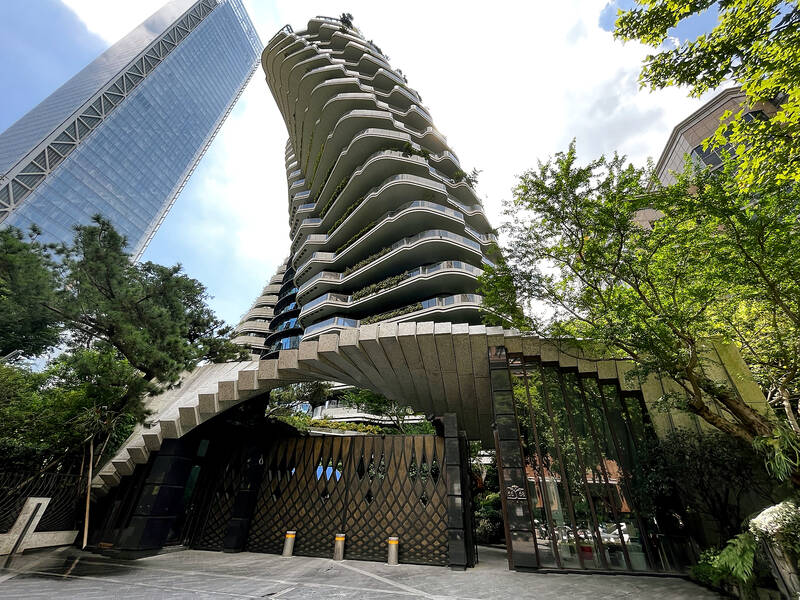Presale and newly completed house prices last quarter picked up 18.1 percent on average in northern Taiwan, but the uptrend might come to an end next year if sales continue to stall, property researcher My Housing Monthly said in a report.
“This segment of the property market has seen a tumultuous year, but has held firm so far, despite unfavorable twists sprouting almost every month,” the Chinese-language publication’s research chief Ho Shih-chang (何世昌) said, referring to interest rate hikes, punitive taxes on short-term property trading, selective credit controls and bans on preorder transfers.
Building material price hikes, labor shortages and a lack of selling pressure have prompted developers to adopt a bold pricing strategy, but a turnabout might be inevitable if sales rates disappoint for an extended period, Ho said, citing a noticeable gain in housing supply in the second half of the year.

Photo: Hsu Yi-ping, Taipei Times
Presale housing projects in Taipei averaged NT$1.06 million (US$33,246) per ping (3.3m2) during the July-to-September period, up 4.2 percent from three months earlier and 12.7 percent from a year earlier, the publication’s report showed.
The price hikes in the capital were broad-based, with presale projects in second-tier Wanhua District (萬華) for the first time commanding more than NT$1 million per ping and more than NT$700,000 per ping in Wenshan District (文山), Ho said.
Neighboring New Taipei City saw presale projects climbing 3.1 percent sequentially and 10.4 percent from a year earlier to a new peak of NT$460,000 per ping, Ho said, adding that presale prices have made records for the past four straight quarters.
Developers now demand more than NT$600,000 per ping for projects in Jhonghe (中和), making it the second-most expensive administrative district in New Taipei City after Yonghe (永和) and ahead of Banciao (板橋), Ho said.
Developers in Taoyuan assigned more importance to affordability in hopes of facilitating deals and therefore priced projects at NT$309,000 per ping, a mild 2 percent increase from the previous quarter, but a 19.8 percent spike from a year earlier, it said.
Presale projects in Hsinchu averaged NT$357,000 per ping, growing 7.9 percent from three months earlier and surging 44.5 percent from a year earlier, as its proximity to the Hsinchu Science Park (新竹科學園區) attracted buying interest, it said.
It would be impossible for housing prices to rise forever and ongoing economic uncertainty might slow the upturn this quarter, triggering a price correction next year amid tepid sales, Ho said.

CHIP RACE: Three years of overbroad export controls drove foreign competitors to pursue their own AI chips, and ‘cost US taxpayers billions of dollars,’ Nvidia said China has figured out the US strategy for allowing it to buy Nvidia Corp’s H200s and is rejecting the artificial intelligence (AI) chip in favor of domestically developed semiconductors, White House AI adviser David Sacks said, citing news reports. US President Donald Trump on Monday said that he would allow shipments of Nvidia’s H200 chips to China, part of an administration effort backed by Sacks to challenge Chinese tech champions such as Huawei Technologies Co (華為) by bringing US competition to their home market. On Friday, Sacks signaled that he was uncertain about whether that approach would work. “They’re rejecting our chips,” Sacks

NATIONAL SECURITY: Intel’s testing of ACM tools despite US government control ‘highlights egregious gaps in US technology protection policies,’ a former official said Chipmaker Intel Corp has tested chipmaking tools this year from a toolmaker with deep roots in China and two overseas units that were targeted by US sanctions, according to two sources with direct knowledge of the matter. Intel, which fended off calls for its CEO’s resignation from US President Donald Trump in August over his alleged ties to China, got the tools from ACM Research Inc, a Fremont, California-based producer of chipmaking equipment. Two of ACM’s units, based in Shanghai and South Korea, were among a number of firms barred last year from receiving US technology over claims they have

BARRIERS: Gudeng’s chairman said it was unlikely that the US could replicate Taiwan’s science parks in Arizona, given its strict immigration policies and cultural differences Gudeng Precision Industrial Co (家登), which supplies wafer pods to the world’s major semiconductor firms, yesterday said it is in no rush to set up production in the US due to high costs. The company supplies its customers through a warehouse in Arizona jointly operated by TSS Holdings Ltd (德鑫控股), a joint holding of Gudeng and 17 Taiwanese firms in the semiconductor supply chain, including specialty plastic compounds producer Nytex Composites Co (耐特) and automated material handling system supplier Symtek Automation Asia Co (迅得). While the company has long been exploring the feasibility of setting up production in the US to address

OPTION: Uber said it could provide higher pay for batch trips, if incentives for batching is not removed entirely, as the latter would force it to pass on the costs to consumers Uber Technologies Inc yesterday warned that proposed restrictions on batching orders and minimum wages could prompt a NT$20 delivery fee increase in Taiwan, as lower efficiency would drive up costs. Uber CEO Dara Khosrowshahi made the remarks yesterday during his visit to Taiwan. He is on a multileg trip to the region, which includes stops in South Korea and Japan. His visit coincided the release last month of the Ministry of Labor’s draft bill on the delivery sector, which aims to safeguard delivery workers’ rights and improve their welfare. The ministry set the minimum pay for local food delivery drivers at